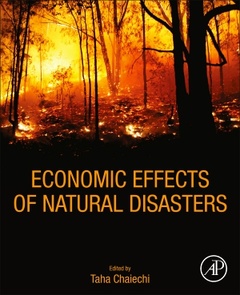Economic Effects of Natural Disasters Theoretical Foundations, Methods, and Tools
Coordonnateur : Chaiechi Taha

- NDRRA funding on the regional economy
- The Effects of Natural Disasters on Stock Market Return and Volatility in Hong Kong
- Climate change and effects: A qualitative experience of selected older adults
- Natural disasters and labour markets: impact of cyclones on the Industries of Far Northern Australia: the case of agricultural businesses.
- Natural Disasters, Geography and International Tourism
- Economic Dimension of Climate Change on Women
- FDI, Natural Disasters and Economic Growth of Host Countries
- Mitigating Impact from Natural Disasters, Building Resilience in Tourism: The Case of Kerala
- Showcasing entrepreneurs’ responses to severe drought
- The influence of environmental pollution and drought on the satisfaction with life of entrepreneurs in Zambia’s mining sector
- Environmental resilience of BoP strategies towards single use plastics: A recipe from an emerging economy
- Semantic Technologies for Disaster Management: Network Models and Methods of Diagrammatic Reasoning
- Methods and Insights on How to Explore Human Behaviour in the Disaster Environment
- State-wide effects of natural disasters on the labour market
- Costing a natural disaster: An accounting perspective
- Typical social adaptation measures in climate change planning
- The impact of natural disasters on agriculture: Evidence from Vietnam
- Economic Impact Assessment of Natural Disasters Using DEMATEL Method
- Climate Change and Natural Disasters: Macroeconomic Performance and Sustainable Development
- Natural Disasters: Macroeconomic Implications and Measurement Issues
- The Asian Tsunami and Tourism: Impact and Recovery
- Effect of Drought on Development of Children: Field Observations from drought prone district of Deccan Plateau of Southern India
- Flood Disasters In Aba North Local Government Area Of Abia State, Nigeria: Policy Options
- Institutional Response And Mechanisms To The Management Of Natural Disaster In Nigeria
- Challenges of Addressing Natural Disasters through Public Policy Implementation: An Examination of Isiukwuato Erosion Menace and the Ecological Fund
- Ecological And Economic Costs Of Oil Spills In Niger Delta Nigeria
- Socio- economic vulnerability to urban floods in Guwahati, Northeast India: An indicator based approach
- Agricultural production and income in a disaster year: Findings from the study of Melalinjippattu village affected by cyclone Thane
- Socio-economic vulnerabilities to natural disasters and social justice
- Alternative scenarios for low carbon transport in Nigeria: a LEAP model application
- Do Natural Disasters Reduce Foreign Direct Investment in Sub-Saharan Africa?
- Integrating climate change adaptation and vulnerability reduction for sustainable development in South Asia and Africa
- Assessing the social vulnerability to floods in India: An application of Super Efficiency Data Envelopment Analysis and Spatial Autocorrelation to analyze Bihar floods
- Economic Effects of Natural Disasters, Valuing drought and flood impacts through well-being approaches
- Economic Consequences of Slow and Fast Onset Natural Disasters: Empirical Evidences from India
Upper-division undergraduates, graduate students, and researchers who work on the economic analysis of climate change, climate change mitigation, natural disasters, and disaster risk reduction
Taha is an expert in systematic modeling of dynamic relationships between economic, environmental, and social variables. Taha’s research attitude is holistic and inspired by issues in climate change and natural disasters, and their impact on different economic sectors such as public health, tourism, environmental, energy, and urban economics, which makes it especially suitable for sustainability analysis. Since 2011, she has been collaborating in several research projects exceeding $1million in value.
- Connects economic theories and empirical work in climate change to natural disaster research
- Shows how advances in climate change and natural disaster research can be implemented in micro- and macroeconomic simulation models
- Addresses structural changes in countries afflicted by climate change and natural disasters
Date de parution : 10-2020
Ouvrage de 664 p.
19x23.3 cm
Thèmes d’Economic Effects of Natural Disasters :
Mots-clés :
ARIMA; ARMAX–; EGARCHX model; Aba North; Accounting; Adaptation; Adaptation policy; Africa; Agriculture; Analysis; Applied category theory; Asian tsunami; Assessment; Behavioral economics; Bihar; Child development; Climate change; Climate change planning; Climate mitigation; Cobenefits; Contextualization; Costing; Cyclone; Cyclones; DEMATEL; Data envelopment analysis; Developing country; Disaster; Disaster event window; Disaster funding; Disaster management; Disasters; Document analysis; Drought; Earthquakes; Ecological Fund; Ecology; Economic; Economic development; Economic growth; Economic impact; Economic performance; Economy; Emergency services; Employment; Energy policy; Entrepreneurs; Environmental hazard; Erosion; Experiments; Flood; Flood vulnerability; Flooding; Floods; Foreign direct investment; Frugal innovation; Gender; Geography; Grothendieck construction; Hybrid model; IPCC; India; Institutional response; Institutional theory; Intangible damages; International tourism; Isuikwuato; Karnataka; Kerala; LEAP model; LVI; Livelihood vulnerability; Local government; Measurement; Modeling; Multinational corporations; NDRRA; Natural disaster; Natural disasters; Natural hazards; Network models; Newspapers; Nigeria; Northeast Australia; Oil spill; Oil spill response; Older adults; Panel VAR; Petri nets; Policies; Policy; Pollution; Poverty; Psychological costs; Public policy; Queensland economy; Resilience; Return volatility; Rice production; Roads; Search-and-rescue



